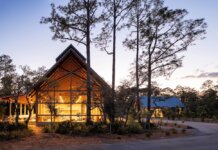
When Pat Rutledge, general manager of Birmingham-based Fiddlesticks LLC, began thinking in 2007 about starting his own company, his client and friend Pete Herndon had a suggestion. Build it around an innovative solid-wood fire starter Herndon had invented in the 1990s.
At that time Rutledge, a Vestavia Hills native, worked in forestry, power transmission and automation after having earned a bachelor’s degree in administrative science from Auburn University and his MBA from the University of Alabama.
“When Pete first came to me with his idea, I thought it was a little crazy,” Rutledge says. “But when I looked into it and found that half of the $40 to $50 million in sales Big Green Egg was generating was from its fire starter material, I began to change my mind.”
Herndon’s fire starter, which doesn’t use toxic chemicals, quickly kicks off fires, burning hotter and cleaner than pressed-wood versions. “Many of us struggle with getting a fire started, so this is a product that helps solve a common problem,” Rutledge says.
The fire starter business idea would take time to germinate, including test marketing and Rutledge’s kicking off an earlier version of the company. But eventually the idea led Rutledge and his partner, Aaron Wisener, to creating Fiddlesticks in 2011. Their green venture uses recycled waste wood from the forest product industry.
The growing company is gaining renown across the nation for its signature fire starters, as well as cooking wood, firewood and lump charcoal. “About 50% of our sales are from out-of-state buyers,” Rutledge says. “Forty restaurants and Five James Beard Award-winning chefs use our wood products.”
In addition to its wood yard in Birmingham, Fiddlesticks has an accounting office in Hoover and a fire starter manufacturing facility in Decatur. The company employs nine workers and subcontracts work to the Alabama Industries of the Blind (AIB), creating jobs for an additional 40 or so employees.
Rutledge is hoping to add up to about 10 more Fiddlesticks employees at its three locations by the end of next year, as well as expanding its need for AIB workers. “We employ them because they recognize the value of our product to the consumer and do a great job,” Rutledge says.
Fiddlesticks also offers transitional employment opportunities through the Offender Alumni Association. The opportunity allows those released from confinement to garner work experience and develop job skills. “Not everyone has a situation where they have jobs for people who are looking for something temporary until they can find permanent employment, but we do,” Rutledge says.
As a proponent of personal responsibility and dogged determination, one of Rutledge’s heroes is Booker T. Washington, who rose from slavery to become the first leader of Tuskegee Institute. In addition to being an educator, Washington was a renowned author, orator and adviser to presidents. “If he could do what he did with the disadvantages he faced at that time, any of us can succeed today,” Rutledge says.
Rutledge’s employment philosophy parallels his desire to avoid wasting resources.
During the Great Recession, for example, his contacts in the logging and forest products industry were hurting for more business. Selling wood waste that could be turned into fire starters as well as cooking and firewood was a godsend for them, Rutledge says.
“So much wood is left in the forest after logging companies come through to harvest for use by wood product manufacturers,” he says. “Carefully sorting through the wood that’s left to find usable wood is too expensive for those companies. We, however, are positioned to sort and use the waste wood.”
Fiddlesticks also uses waste cast off by wood product manufactures. “I was impressed as a young man by hearing the CFO of a major carpeting manufacturer talk about how the company discovered they could actually make money by recycling the waste materials rather than dumping them into the environment and facing lawsuits,” Rutledge says. “That really stuck a chord in me.”
Among his major wood waste suppliers are Cheaha Timber and Cheaha Tie & Timber in Lineville and Cahaba Veneer in Centreville. “Jim Wakefield is a second-generation logging company owner and said he felt sick seeing the leftover woods left to rot after they came through,” Rutledge says. “One hundred truckloads of wood might be left.”

Of about 100 truckloads of waste wood Fiddlesticks might collect and sort, as much as two truckloads of usable wood might be found. That wood can be sold back to suppliers. In addition, any waste Fiddlesticks has left over following its processing can be used for compost and soil. “We can’t recycle everything, but we keep looking for ways to recycle as much as possible.”
Fiddlesticks’ first major customer was a group of 35 Piggly Wiggly stores. “If you look at the charcoal aisle, which is next to the mops, it’s usually relatively ugly,” Rutledge says. “We developed a basket of grilling products, including cutting boards, with attractive packaging that could be sold on that aisle.”
As the company developed, it began selling cooking woods, including green hickory wood. It now supplies wood not only to individual consumers but also to gourmet restaurants, including Betolla, Highlands Bar & Grill and OvenBird in Birmingham. Fiddlesticks’ cooking wood products account for 25% of sales, Rutledge says.
Another 25% of revenues is generated through sales of high-quality lump charcoal produced by suppliers Fiddlesticks has vetted. “One day we might manufacture our own lump charcoal but not at this point,” Rutledge says. “We are busy with expanding our business in other areas, including adding more automation to the wood yard.”
As Fiddlesticks has taken on new major customers, its business has shifted and continues to evolve. Rutledge estimates that this year up to about 50% of sales will be from firewood. “One order by a major retailer is going to double our firewood business,” he says.
Looking toward the future, Fiddlesticks is considering opening additional out-of-state supply locations, as well as targeting the Japanese and Australian markets. “The Alabama Small Business Development Center at the University of Alabama did a study for us showing that our products would likely be popular in those international markets,” Rutledge says. “We are always looking for new opportunities.”
He and partner Wisener are working on planting select hardwoods on their land in Springville as a product development project. “After one of our Alabama tornados, it’s hard to replace mature trees just by planting acorns,” Rutledge says. “But you can replant with trees that are five or six years old, and they will grow relatively quickly.”
Fiddlestick products are available through online purchase at its website burnfiddlesticks.com and its distribution warehouse near Pepper Place in Birmingham, where AIB runs Fiddlesticks’ “will call” window. Certain Alabama Piggly Wiggly locations also sell Fiddlesticks products.
Kathy Hagood and Joe De Sciose are Birmingham-area freelancers for Business Alabama.
This article appeared in the May 2022 issue of Business Alabama.



